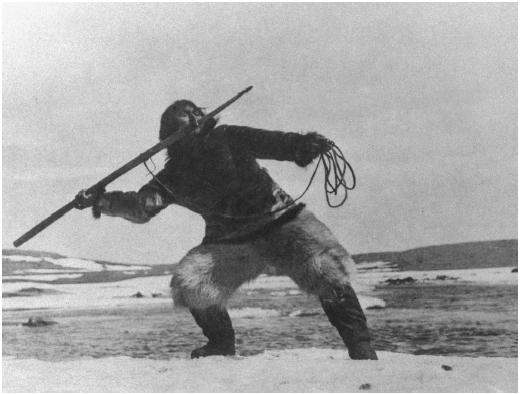 |
Marlon Brando and Francis Ford Coppola's
Apocalypse Now, as documented in 1991's
Hearts of Darkness: A Filmmaker's Apocalypse |
I'm like Michael Moore except I'm skinny, my jeans are washed and God loves me.
- Ned Flanders ("The Simpsons")
Documentaries are snapshots of people, places, or things with which we may not be familiar. Good non-fiction films are made every year - this list is not the "greatest documentaries of all time." There are plenty of films much better than some of these, but these five are the most important in the history of documentary filmmaking - the ones that paved the way, made a name for the documentary film industry, and really are what the films now will always be measured against, in terms of historical significance. So, here they are, in chronological order.
 |
| courtesy of filmreference.com |
| Nanook of the North (1922)
The first of its kind, this predecessor to the field of documentary filmmaking paved the way for everything. Director Robert J. Flaherty spent an entire year with Nanook and his family of Inuit Eskimos living in the Arctic circle, learning the customs and ways of life of this group of people barely touched by even the infant technology of the day. Still viewed as the first full length anthropological documentary ever made, it showed what powerful things could be done with just one camera and a subject. |
 |
| courtesy of eutorrents.com |
| Triumph of the Will (1935)
A propaganda documentary of the highest order, Leni Riefenstahl's capturing of the 1934 Nuremberg, Germany Nazi party rally is, without a doubt, one of the most infamous films ever made. Giving an outlet to some of the top Nazi party officials, including Adolph Hitler, Josef Goebbels, and Rudolph Hess, this simple, yet terrifyingly influential film was a rare peek inside the minds of these tyrants, but also an example of how one piece of art can have a worldwide ripple effect. |
 |
| courtesy of documentary-review.com |
| The Thin Blue Line (1988)
Filmmaker Errol Morris has made a bevy of fascinating, topical documentaries (my favorite is Gates of Heaven), but his 1988 expose on corruption in Dallas police force and the wrongful murder conviction of a man is proof of what investigative journalism can do. The Thin Blue Line is, in a way, the precursor to shows like "Dateline," in the way it takes a topic and successfully provides point-counterpoint through reenactments and interviews with those involved. It's a detailed, fascinating look at what can be done if you push a little further, look a little closer, and think a little more clearly. |
 |
| courtesy of gstatic.com |
| Roger & Me (1989)
I'll be blunt - I don't like Michael Moore. His films are sheer propaganda, essentially comprised of him bothering people with the same questions until they get angry and rearranging chronology through post-editing to make his somewhat arrogant viewpoints more plausible. Though Bowling for Columbine is probably his best film, Roger & Me got him started, making a case against General Motors CEO Roger Smith and the downsizing of the company, thereby deeply impacting Moore's hometown of Flint, Michigan. It's sensationalized and a bit overwrought, but damn if it doesn't do it's job. |
 |
| courtesy of thefilmyap.com |
| Hoop Dreams (1994)
The gold standard in terms of modern documentary filmmaking, with Hoop Dreams, director Steve James builds an intimate portrait of two young men in inner-city Chicago and their goal of becoming professional basketball players. This look at talented young William Gates and Arthur Agee is a never-before-seen view of the hierarchy of the school systems, the dedication to a seemingly unobtainable dream, and the effect it all has on families that can barely eat, let alone pay for private school. It's an epic, layered, and satisfying look at who is affected when potential is recognized and exploited, whether willingly or not. |
Documentary filmmaking - despite how much it has changed - is still the most simple way to tell a story. There may be better films than the ones above, but documentarians owe a debt of gratitude to what the above films accomplished to pave the way for them.
Other Considerations
Titicut Follies (1967)
Harlan County, U.S.A. (1976)
Super Size Me (2004)
Grizzly Man (2005)
Man on Wire (2008)
An Inconvenient Truth (2008)







No comments:
Post a Comment